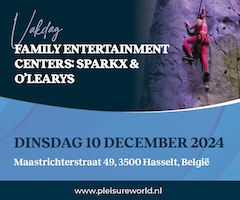Why social Inclusion is important to address
Leisure and tourism experiences as catalysts

I have recently been appointed as a full Professor of Leisure and Tourism Experience at Tilburg University. In my inaugural lecture, due on June 10th of this year, I address the research program I want to pursue in my professorship. Social inclusion is one of the focus points of this research program. In this article I briefly outline how and why social inclusion is an important point to address in the scientific study of leisure and tourism.
Marcel Bastiaansen is Professor Leisure and Tourism Experience at Tilburg University.
Historically, the academic study of leisure branched off from sociology. After World War II, the study of leisure developed into encompassing, amongst others, leisure stratification – the notion that differences in social class, ethnicity and gender strongly determine the types of leisure activities people engage in. Obviously, such stratification results in the fact that leisure participation increases rather than decreases the boundaries between different social classes, promoting social exclusion rather than inclusion. Around the turn of the millennium, Leisure Studies reorganised itself around new areas of interest (reviewed in Bouwer & van Leeuwen, 2013). A common unifying theme was to study the (individual, social and cultural) meaning of leisure, and to attribute a central role to the lived experience (Blackshaw, 2010) of individuals. Nowadays, the notions of meaning and experience are still very much alive in the scientific debate on the role of leisure in society (see e.g. Duerden et al., 2018), and together they provide a useful framework for understanding how leisure, and more specifically meaningful leisure experiences, may serve as catalysts to promote social inclusion. Leisure and tourism, being activity-oriented, have a tremendous potential to bring different social groups together at the same time, at the same place, and with shared content. This creates ideal platforms for different social groups to interact (Collins, 2004). These interactions can serve as a catalyst for enhancing mutual understanding and promoting social inclusion.
Leisure and tourism have a tremendous potential to bring different social groups together at the same time, at the same place, and with shared content.
In a recent study (van Bendegom et al., 2021) we took an initial step towards establishing a research approach for this issue. We measured the experience of attending a theatre show in young adults that very frequently attend the theatre and in young adults that never, or very rarely attended the theatre. Results showed that, although both groups differed in terms of perceived leisure constraints and pre-existing cultural socialization, the experience of both groups of the theatre show was quite similar in terms of emotional engagement. These results are informative for policy makers, for designers of cultural experiences (such as art directors and museum curators) and for marketeers of cultural institutions, as they indicate that attempts to broaden cultural consumption amongst young people, efforts should be directed at improving accessibility of cultural activities rather than of adapting the contents of the cultural offerings to the needs of these infrequent visitors.
Next steps in this line of research should explicitly address whether the experience of joint attendance is (equally) meaningful for different groups of participants, and whether it promotes intergroup contact and mutual understanding across different social groups. Note that instead of focusing on frequent vs infrequent attendants of theatre shows, different groups can be defined, for example, such as tourists vs local residents. In that context, joint experiences and intergroup contact should be aimed at improving the mutual understanding between residents and tourists, and as a result optimize the social impacts of tourism. More broadly, the approach of creating common platforms for different social groups by designing leisure and tourism activities, and of evaluating the meaningfulness of the experiences of the different groups, will likely provide relevant knowledge on how to use leisure and tourism experiences as catalysts for broadening societal participation, and for promoting social inclusion.
References:
- Blackshaw, T. (2010). Leisure. Routledge.
- Bouwer, J., & van Leeuwen, M. (2013). The meaning of liquid leisure. In Routledge Handbook of Leisure Studies (pp. 606-618). Routledge.
- Collins, R. (2004). Interaction ritual chains. Princeton University Press.
- van Bendegom, C., Mitas, O., Boode, W., de Rooij, P., & Bastiaansen, M. (2021). When the arts are not your cup of tea: Participation frequency and experience in cultural activities. Journal of Leisure Research, 1-24.
































































